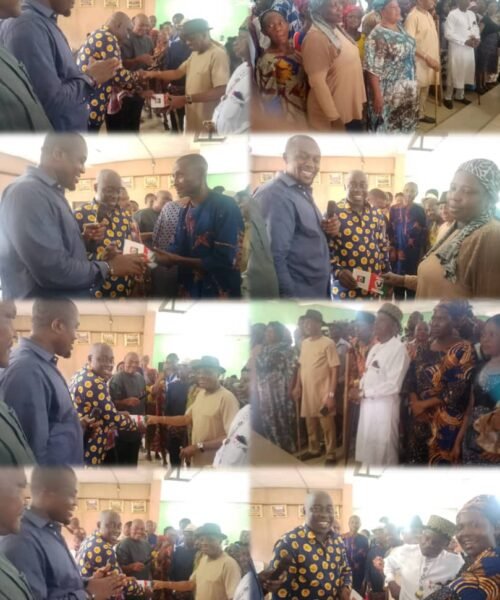The Digital Reinvention: How Governor Otti is Retooling Abia’s Public Sector for a Tech-Driven Future
In a bold move emblematic of his administration’s forward-thinking ethos, Governor Alex Otti has dispatched four senior Abia State officials to China for advanced technological training—a strategic investment poised to redefine public service efficiency and innovation. This delegation, comprising Ms. Chibuzor Elizabeth Chijioke (Special Assistant on Science, Technology & Innovation), Mrs. Justina Eboh (Permanent Secretary, Ministry of Science & Technology), Mrs. Nnedinma Nwadinobi (Ministry of Arts, Culture & Creative Economy), and Mr. Ogwo Chimaoge (Bureau of Training), will undergo intensive instruction from July 17 to August 6, 2025, in Hubei, Jiangsu, and Henan provinces. Sponsored by China’s Consul General in Lagos and hosted by the Wuhan Research Institute of Posts and Telecommunications, their curriculum focuses on cloud infrastructure security, AI/5G integration, and smart city design—knowledge critical for implementing Abia’s digital governance blueprint. This international upskilling mission underscores Otti’s conviction that global exposure is non-negotiable for bureaucrats steering a 21st-century economy.
Building Foundations: The TechRise Revolution
The China initiative expands upon the groundbreaking Abia TechRise program, the administration’s flagship digital skills accelerator. In partnership with LearnFactory Nigeria, the first cohort graduated 509 trainees in May 2025 after three months of intensive training in artificial intelligence, backend engineering, and digital animation. Demonstrating his commitment to meritocracy, Otti granted automatic civil service employment to the top 19 performers, instructing the Head of Service to fast-track their onboarding by May 12, 2025. Each graduate received certified laptops, transforming theoretical knowledge into immediate entrepreneurial or employment capacity. Governor Otti’s philosophy—“Rather than give you fish, we equip you to fish”—drove the program’s design, with a second cohort targeting 850 trainees (50 from each LGA) already launched. The initiative deliberately bridges digital skills with practical economic participation, empowering graduates to “sit here and work for Google, Microsoft, anywhere” while revitalizing local industries.
Rewiring the Civil Service: Digital Backbone and Accountability
Parallel to skills acquisition, Otti’s administration is executing a systemic overhaul of bureaucratic infrastructure through the Umuahia Dedicated Internet Access/WAN Project. Launched in March 2025, this fiber-optic network interconnects all ministries, enabling seamless digital workflows, VoIP communications, and e-governance protocols. Governor Otti emphasized its role in eliminating paper-based inefficiencies, projecting a 40% reduction in operational costs through electronic document tracking and virtual collaboration tools. Critically, this digital transition is reinforced by a performance-linked accountability framework: civil service promotions now require demonstrated tech proficiency. As Otti declared, “The old era of operational inefficiency is gone; up-skill or become uncompetitive”. This carrot-and-stick approach—couching cutting-edge tools with mandatory competence standards—signals an uncompromising shift toward a digitally native bureaucracy.

Academic Roots: Reforming Education to Fuel the Talent Pipeline
Recognizing that sustainable workforce transformation begins in classrooms, Otti’s AbiaFIRST Education Initiative (February 2025) targets systemic educational reform. The program prioritizes teacher retraining, STEAM integration, and digital learning platforms to nurture tech fluency from primary levels. Commissioner for Education Elder Goodluck Ubochi clarified that this transcends infrastructure—it’s a “complete institutional reform” embedding technical vocational education and computational thinking into curricula. The administration backed this vision with aggressive financial commitment, allocating 35% of the 2025 budget to education and health. Though opposition voices questioned expenditure transparency, the administration’s abolition of all primary/secondary school fees—replaced by direct imprest funding to administrators—removed financial barriers to access, reinforcing Otti’s mandate: “There is no excuse to extort or deny any child the opportunities that come with learning”.
Synthesis: A Coherent Architecture for Future-Proofing Abia
Otti’s retooling strategy operates at three interdependent levels:
- Global-Local Skill Transfer: The China training immerses leaders in frontier tech, expecting them to contextualize insights for Abia’s digital projects like statewide fiber-optic rollout and AI-assisted governance.
- Grassroots Tech Democratization: TechRise and vocational programs (e.g., Fashion Future targeting women and PWDs) convert abstract digital literacy into income generation, evidenced by Aba shoemakers achieving 300% export growth via e-commerce platforms.
- Systemic Enablers: Fiber networks, laptop distributions, and e-governance tools provide the hardware, while education reforms and promotion criteria reshape the human software.
This architecture doesn’t merely react to technological change—it anticipates it. When Otti envisions traders “consummat[ing] business on virtual platforms without leaving home,” he frames connectivity as an economic right. The ₦10 billion Bank of Industry pact for tech startups and solar power investments further fuels this ecosystem, merging immediate job creation with long-term industrial capacity.
“We are setting structures so our people prosper right here—the future is bright.” — Gov. Alex Otti
As Abia’s retrained officials return from China and TechRise graduates deploy their skills, Otti’s masterstroke becomes clear: he’s not just building a tech-savvy workforce but engineering an innovation culture where civil servants evolve from administrators to architects of a digital renaissance. The measurable outcomes—12,000 artisans lifted from poverty, 60% tech graduate employment within six months—underscore this transition from potential to potency. In Otti’s Abia, every laptop distributed, every fiber laid, and every bureaucrat retrained is a stitch in the tapestry of a state repositioning itself not as Nigeria’s follower, but as its digital frontier.
Dr Chukwuemeka Ifegwu Eke







